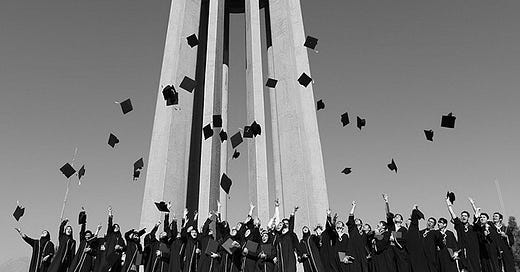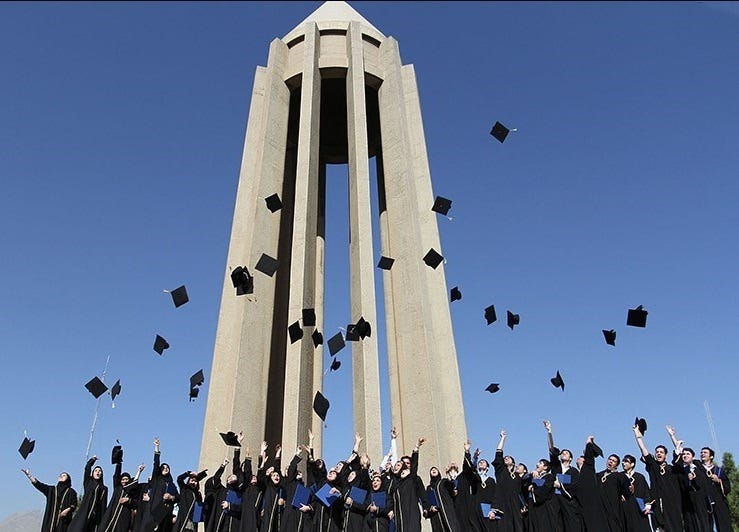My high school graduation—or, sorry, *commencement ceremony*—is this evening.
I won’t be giving a speech or anything. This is fine, and I feel fine about it, and not at all pissy. It’s fine. I think the three guys all doing a weird half-rhyming speech-song thing together that they picked instead of me will be super-duper good. Super. Duper.
Of course, I’ve still been thinking about what I might’ve said. And since the administrators won’t be vetting my thoughts or anything, here they all are, good and bad.
As I’ve reflected on my time at WIHI, Paul Simon has become my guiding light:
When I think back on all the crap I learned in high school,
It’s a wonder I can think at all.
This strikes me as very profound. Because, truly, much of my high school education has been defined by crap.
In ninth and tenth grade, I was taught that tolerance was racism. I learned that literary criticism consisted of contorting an author’s words until they became “queer-coded” and anticapitalist. I was shown a documentary in economics class about how a full six degrees of global warming were all-but-guaranteed, and how they would be totally life-endingly catastrophic.
I’m lucky to have woken up and rebelled against all this at some point—quite frankly, I think I ultimately have my Zionism to thank for my negative polarization against modern progressivism. And I’m even luckier to have had one or two decent humanities teachers who engaged with, or were at least amused and not offended by, my more skeptical beliefs.
Now, to be fair, I learned plenty of non-crap things in high school too. I have a (very tenuous) grasp of special relativity and a solid understanding of Newtonian mechanics. I know what a ligand is. I can do calculus, or find the vector of intersection between two planes.
I’m glad that I learned these things at WIHI, though I know I could’ve learned them elsewhere. I have my dad’s old textbooks, but I never really got around to reading them—being forced to learn makes up, unfortunately, much of school’s utility.
Of course, an even larger share lies in the social aspect.
When I made my center-left-flavored arguments in humanities classes, there were lots of annoying far-lefties to argue with. Some became friends; one became a girlfriend.
And when I was going through my most militantly atheist phase—the one that led me to start this blog—there were lots of committed theists around to argue with. Some became friends; one became a girlfriend.
To be clear, not every social relationship I’ve ever had was a result of argument—though it is quite probably the most direct path to my heart. Some of my closest friends are extremely similar to me.
I just spent five days roadtripping with one—we first did a project together when I was in 5th grade, then bounced around the outskirts of each other’s social circles until we reconnected through the Ethics Bowl club in 9th grade. Even then, it took us a while to become real buddies—maybe two or three years until we were having lunch and playing in the river together on a weekly-ish basis.1
Another friend was, for years, nothing more than a legend to me. See, in freshman and even well into sophomore year, I was a total loner. I wore a mask long past the time most had stopped—not as a political statement, nor out of concern for my health, but mostly because I had a weird degree of self-consciousness over my burgeoning fuzzstache. (I have since learned to shave regularly.) Well, over this time I was able to make one or two half-friends, and around a dozen acquaintances, and from all of them I would hear: “Oh, you’re so much like A.” “You should hang out with A.” Things like that.
A was, according to the legends, much more social than I, but somehow just as nerdy and computery. We ran into each other a couple times—WIHI’s a small school—never really sticking, until we ended up in the same little physics class, sitting at the same table. In junior year, something clicked, and we became great friends. On our last day of classes, he biked across town to meet me, then we biked together back across town again to school. We like to get coffee together, play Geoguessr, and memorize the provinces of foreign countries.2
There are other wonderful social memories I’m leaving out. Various deeply meaningful romantic entanglements, which I don’t really know how to write about; seven weeks dorming with another friend last summer, which really deserve their own post; and plenty, plenty more.
All these things, in the vaguest and most distant sense, WIHI made possible. And now I’m graduating from WIHI, moving away from all of them—the people and the memories.
We live in the digital age, I know. I’ll be able to text or call my friends whenever I like. I can play games with them online, schedule times to meet back up, stay in touch. I’ll of course do all those things.
But still, something is ending. Seeing once every couple months is a very different thing from seeing every day. In-person contact still matters, still counts. This sort of thing can kill relationships—I’m not really in touch with any of my closest friends from elementary or middle school anymore. And I don’t want it to! If I’ve got any say in the matter, I won’t let it—my roadtripping friend has been in college for a year already, and obviously we’re still very close. But there are no guarantees, and I’m worried that I’ll quickly lose touch with people who’ve meant a lot to me.
As much as I hate the cliche—as much as I’ve been telling myself and my friends and my family for months, “I can’t wait for it to be over”—there really is a bitter edge to the sweetness of graduation. I’m excited to go off somewhere new, and to learn lots of new incredible things there. And I’m hopeful, if a little nervous, about the chance to meet lots of new incredible people.
But I think that when I sit on the stage tonight, ignoring the inoffensive pablum about how we’ve all become Global IB Principled Reflective Thoughtful Learners, I’ll mostly feel sad.3 I’ll be remembering and mourning all the relationships that have already ended and morphed and ended again—and worrying about the terrifying trajectories the ones left might take.
And then I’ll get up, walk over, grab my diploma. Shake the principal’s hand, smile, and look for my parents’ faces in the audience. I’ll watch all my classmates do the same thing; some of them will cry and stumble, others will saunter and strut.
We’ll all leave the auditorium full-fledged high school graduates, sharing suddenly so little in common. Just the same name on a piece of paper, not a shared home seven hours a day. The relationships that deserve to last will, and the ones that don’t won’t.
I’ll know soon whether mine are of the deserving kind. I sure hope they are.
This has been one of the most meaningful activities of the past few years for me. I wrote a little mini-essay about it some time ago:
A lot of Seinfeld scenes are in Monk's Cafe, the actors talking mostly about nothing, with a hint of Jewish humor.
For some years, I struggled to live up to this, but eventually I found a good, close friend named Z, and a good, nearby restaurant with corned beef hash. And last summer, we ate there ~weekly, talking mostly about nothing, a bit Jewishly. It was the most like me I'd ever felt.
---
I see Z. He cracks some mean joke about my shirt, I tell him he’s going bald.
We sit. Politics come up first: "Biden's unfit" or something, then we fantasize about a Beshear or Buttigieg candidacy.
My coffee comes, Z’s sprite. He's talking my ear off about a video game he plays a lot and I play a little.
Corned beef hash arrives, plus some gravy. We're talking about our romances. He repeats his usual line: "Quality time is nice, but *quantity* time really matters.” I make agreement noises.
Our plates are nearly clean. I’m telling him about 17776—a sci-fi story about nanobot-empowered football—and he’s trying not to look bored.
We pay. The river’s nearby, and we walk a little while to marvel at the dam together.
I tend to deal mostly in the coffee; A does more of the Geoguessing and province-memorizing.
Clarifying note for anyone who plans to be at the ceremony: don’t expect me to cry, I still think public crying is gross and bad.






Congratulations! I know what you mean being afraid of loosing friends. Imagine leaving a country for ever, and no Zoom or Face time:) i still miss my very close friend from college whom i lost contact with completely. Somehow I am not very good with long distant friendships. It takes a lot of effort and my energy was limited with all the struggles of new life and career. I hope you wont be sad for long. Get ready to meet new friends and learn a lot more crap and some useful things as well:) ❤️
oh who is u